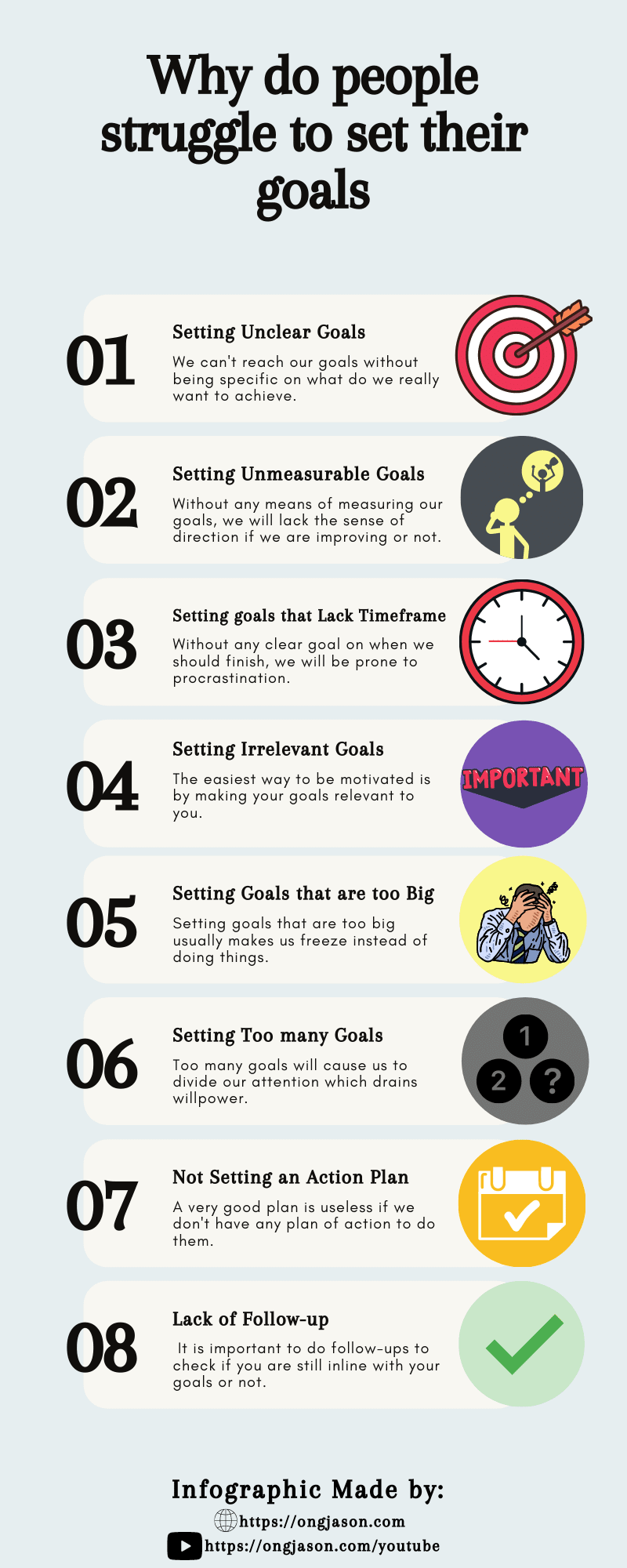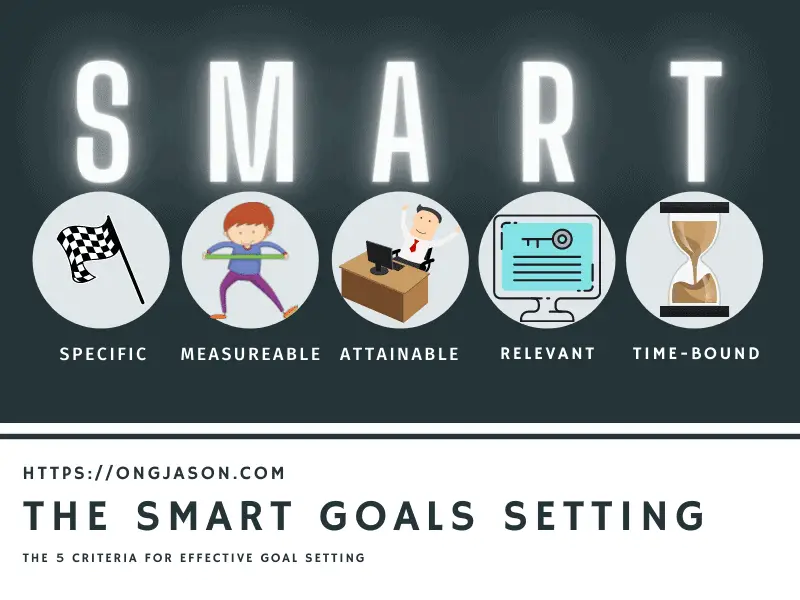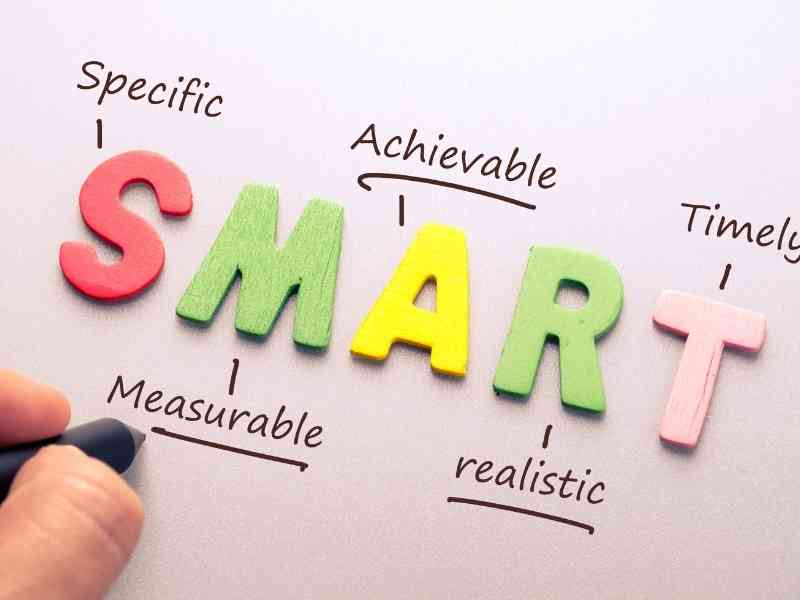Why do people struggle to set their goals?
Planning or setting your goals is very important if you want to succeed in achieving them. Thus, setting your goals is half the battle. Without proper setup, working on our goals will be very inefficient. Thus, this article is meant to solve that and give the reason why people struggle to set their goals.
In general, here are the reasons why people usually struggle to reach their goals:
- Setting Unclear Goals
- Setting Unmeasurable Goals
- Setting goals that Lack Timeframe
- Setting Irrelevant Goals
- Setting Goals that are too Big
- Setting Too many Goals
- Not Setting an Action Plan
- Lack of Follow-up
These reasons actually make people fail in just the setting-up phase. There are big problems we have to solve and identify.
Also, if you really want the very summary, here is the main reason why we struggle to set our goals.
We struggle to set our goals because we usually set too big or too many goals at the same time. Furthermore, we also create goals that do not follow the SMART guidelines which makes them unclear, unmeasurable and a lack of timeframe.
Remember that the SMART guidelines are actually very important if we want to set our goals correctly. The reason people find trouble in setting and reaching their goals is that they don’t follow this guideline.
Thus, this article will discuss the reasons why people struggle to set and achieve their goals plus solutions to each of them.

1. Setting Unclear Goals
Setting unclear goals is one of the biggest mistakes people make in goal setting. The reason for this is because we can’t reach our goals without being specific on what do we really want to achieve. Without clear objectives, it is hard to hit the goal or target.
Setting unclear goals is one of the common reasons why people fail in achieving results.
The reason for this is because, without a clear target, we can’t really know where we want to go.
The best way to explain this is when trying to go to a certain place, we first have to go where exactly is the place. Without knowing where you want to go, then it is close to impossible to get there.
That is the same for goal setting.
If you set goals that are vague or unclear, it will be close to impossible to reach the goal. That is one of the biggest problems that people do and why most fail in their goal setting.

How to Set Clear Goals
The solution is very simple, just know what your goal is.
Always follow the SMART goal setting.
In smart, the S stands for Specific. We have to be specific and clear with our goals if we want to achieve things.
For example, if you want to have savings, be specific in how much do you want to have as savings.
Let’s say your goal is to have $5,000 in savings.
That is way better than just saying that you want to save money.
Be clear to yourself on what you want and working on your goal will significantly be easier.
2. Setting Unmeasurable Goals
Setting unmeasurable goals is one of the reasons why people fail in goal setting. Without any means of measuring our goals, we will lack the sense of direction if we are improving or not. Thus, people won’t know if they are achieving their goal or failing.
It is very important to have a measurable goal. Without any measurement, how do you expect to know if you are improving?
One of the important things to do if you want to achieve your goals is to measure if you are improving.
For example, if you want to have $5000 savings in one year, then you should make sure that you have about $1200 in savings within the first 3 months. This makes sure that you are going to your goal.
Setting unmeasurable goals such as saying that you just want savings, or you just want to lose weight is not ideal since you have no sense of direction if you are getting closer to your goal or not.
How to Set Measurable Goals
You can easily set measurable goals by finding out what can you do to measure your goal.
For example, if your goal is to jump higher, then you need to find a way to measure how high can you jump. You can use inches as a means to measure your goal.
If you are planning to save money, then to make it measurable is to measure it with your local currency.
3. Setting goals that Lack timeframe
Setting goals that lack timeframe is a big mistake when we are talking about goal setting. The reason for this is that goals usually need a sense of urgency in order for us to do them. Without any clear goal on when we should finish, we will be prone to procrastination.
Why do you think that at work, we have deadlines. In school, we also have deadlines.
Almost everything important in our life has some sort of deadline.
The reason for this is that we are prone to procrastination. Procrastination makes us human. There is nothing wrong with that since it was designed to make us conserve energy, especially for our ancestors.
The problem with setting goals without any timeframe is that we won’t have the sense of urgency to finish it.
For example, when we usually have projects at work or school, we usually don’t do it until the last day or week. When we have a lesson in school, we won’t study it and we usually wait for exam day before reviewing.
Those are examples of what procrastination does and what deadlines can do.
Only by setting deadlines on our goals where we can be sure we will do something about it.
That’s why. It is irrelevant to say that I am going to lose 20lbs of weight. That is because, without a sense of urgency or timeframe, we will just procrastinate and do something else.
Thus, in goal setting, we have to make sure that we are also going to set a timeframe.
How to Set a Timeframe for our goals
The best way to set a timeframe is to put a time limit to your goals.
As an example, in the example above where the goal is I am going to lose 20lbs of weight, we have to put a time limit.
Thus, the “I am going to lose 20lbs of weight.” can become “I am going to lose 20lbs of weight in one year.”
With a time limit, you will feel a sense of urgency to finish things.
I should also note that in setting a timeframe, the shorter the time, the better. This means that the daily timeframe usually produces the biggest result.
But I am someone who is more into weekly goals. There are numerous advantages to weekly goals but I also know that daily goals will produce the best result. If you want to know why then you can read this article where I compared daily, weekly, monthly, quarterly, and yearly goal setting. How often should you set goals?

4. Setting Irrelevant Goals
Setting irrelevant goals that are not in line with your biggest goals in life can significantly reduce our productivity. This is because of the principle of switching cost. The more things we do, the lesser our quality of work and productivity on tasks causing poor goal setting results.
The definition of irrelevant goals are goals that are different from our values, principles, or larger goals.
Irrelevant goals will divide your attention into other things that you don’t really need.
For example, if you’re really a night owl, then you can try to wake up early as your new goal but the results will just be someone who is groggy simply because it is in your DNA.
Another example of a relevant goal are goals that matter to you. If you’re having goals based on what others just want you to do, then there is a high chance that you are not doing your best in doing it.
Not doing your best simpy means that it won’t make big results.
It is like your boss giving you an order and you are just following it because it’s an order. Without the passion to do it, without its relevance to you as a person, you will not do your best in working on it.
It’s the same with your goals.
Without the passion to achieve your goals, without its relevance to you as a person, it is hard to succeed.
That’s why motivation is necessary. If you’re motivated to do something, then it will be easier to do it.
I’ve actually made an article discussing motivation in detail. In there, you will know how to find your innermost motivation that can produce the best results. It is recommended if you need more motivation in self-improvement.: Motivation: Emotional or Mental State?
How to set relevant goals
To set relevant goals, find the ones that are important to you.
That way, you will be motivated in reaching your goals since motivation reduces the willpower we’ll consume in doing an action.
That’s why you can easily do hard things when motivated.
So if you want to make goal setting easier, then find ways to get motivated.
And the easiest way to be motivated is by making your goals relevant to you.
5. Setting Goals that are too Big
Setting goals that are too big usually makes us freeze instead of doing things. The reason for this is because there are times where we set goals that are too much for our current selves to handle. That’s why setting too big goals is an incorrect way of doing goal setting.
When we are facing big problems, it is natural for us to just hide or do nothing about it.
It is natural for humans to not like hard things.
Thus, if you make a very big goal, we usually find ways to prorastinate and do nothing about it.
As an example, let’s say your goal is to save some money.
If you say that your goal is to save a million dollars then most likely, you will just freeze and postpone your goal.
The reason for that is that it seems for far-fetched.
It might even come as a joke to some people if you tell that goal.
How to set big goals
Don’t get me wrong. You can still make big goals that works.
Let me show you how.
The key to making big goals is to cut them into smaller goals.
For example, in my case, I want to produce 90 blog post this quarter.
90 blog posts is just too much if I just plainly see that.
Here’s the thing. Did you notice the “this quarter”?
90 blog post per quarter means 30 per month and it is about 8 articles weekly.
Now, 8 articles weekly is very doable since I can do about 2 per day if in the mood, then 1 if not.
90 articles doesn’t seem hard now.
To set big goals, you have to make things easy to do. To make it easier, then try to make your goals smaller.

6. Setting Too many Goals
Setting too many goals is one the biggest mistakes people make when we talk about goal setting. The reason for this is that too many goals will cause us to divide our attention which drains willpower. This ultimately leads to burn-out and giving up early.
In one of my article on how many goals should we set per year, I stressed about the importance of having few goals.
The reason is very simple.
Too many goals, like making big goals makes us freeze and do nothing about them.
If we try to do many things all at the same time, we will fragment our attention which will significantly reduce productivity.
Another is that when we have a lot of things to do, we usually wind up doing nothing.
For example, how many times do you not want to get out of bed when you have a lot of work to do?
For me, a lot.
In self-development, it is more important to do small things consistenly overtime rather than making it big then quit in the middle.
How to Set Fewer Goals
To set fewer goals, we have to find out what is the most important goal we have to finish.
By finding the most important one, we can focus on that goal and achieve bigger results.
I actually made an article discussing how to effectively set goals, in there I also focused on focusing on one thing. Here is the link if you want to read that: How to Create a List of your Goals
But the key thing is to find the most important or the goal that can affect a lot of aspect of your life.
I call that meta-skill.
For example, exercising not only makes you healthier, it also makes your brain work better. Furthermore, it gives you more energy to work more. WIth more energy, you can work more and have more income.
The more income you have, the easier you can easy healthy.
Did you get the cause and effect? That’s a meta-skill.
7. Not Setting an Action Plan
Goal setting without any plan to do any action is one of the mistakes most people make. The reason for that it is having a very good plan is useless if we don’t have any plan of action to do them. WIthout action, there will never be any result.
No matter how good your plans are, it is completely useless if you do nothing about it.
It doesn’t matter if you have the best idea out there if you don’t do something to make it a reality.
It doesn’t matter if you plan to make a business without doing something to make it.
Without any plan of action, none of your goal setting will come to life.
How to Set an Action Plan on Goal Setting
To set an action plan on your goal setting, you first have to once again check your timetable.
After that, make sure that your goals are measurable since we are going to measure the progress while doing some action.
For example, It my plan is to make 90 article this quarter, then I should make 8 articles weekly. That means that I should plan to make 8 article weekly.
8. Lack of Follow-up
The lack of follow-up is one of the most neglected things in goal setting. It is important to do follow-ups to check if you are still inline with your goals or not. Without follow-ups, almost all goal settings will surely fail to produce good results.
The last but most important is follow-up.
Without follow up, many of us will fail.
The reason for that is how would you be sure that you are on the right track without follow up? How can you measure if you are doing it right or wrong without it?
That’s why it’s important to do follow-up.
An example of how to apply follow up is this.
In my example above, I do a weekly follow-up if I did make 8 article this week. That way, I can be sure that I am slowly finishing my 90 articles goal.
This simple step is often neglected but in my opinion, it’s very important.
For example, if you want to lose weight and you noticed on your follow-up that you are instead gaining some weight, then there must be something wrong with what you are doing.
Thus, it might be a sign to change something.
With follow-ups you can be sure that your goals would be achieved.
With these in mind, I am sure you wouldn’t be struggling in goal setting. You have all the key steps to make it.
I believe that with these, you will be part of the top 12% of people.
Why? Because only 12% of people succeed in doing their new year’s resolution, and 88% fail because they didn’t know these tips I’ve gave you.
Feel free to share this with the people you care about so they can also be part of the top 12%.

“Only the things I love.“
ongjason.com is reader-supported. When you buy through links on the site, I earn an affiliate commission.
If you’re following me, you’ll know that I believe it is essential to have some tools, whether it’s for personal development or lifestyle in general.
So, here are the things I love.
YouTube
If you want to learn things for free, I recommend watching my YouTube Channel. Click the Button Below to go straight into my Channel. 🙂
Okay, let me first explain my Channel.
I believe that I really can’t explain everything too well on my blog. That’s why I created a YouTube Channel so I can easily explain a lot of things. Plus, I believe that Video Sharing is the future.
Recommended Books
The next thing is books. Books are, for me, one of the cheapest ways to get invaluable information. We can learn personal development, finance, career, relationships, and many more from books.
Here, I will be listing my favorite books in different categories.
- For Beginners – 7 Habits of Highly Effective People by Stephen Covey – Personal development has a lot of concepts and ideas to learn. Thus it can be really hard for beginners to know where to start. Thus, I recommend this book since all the basic concepts of personal development are here(except finance, check what I recommended for that)
- Productivity – The One Thing by Gary Keller – This book teaches us the power of focusing on one thing which is the ultimate source of productivity. The concepts taught are what I am using to constantly publish YouTube videos while maintaining this website.
- Busy? – Make Time by Jack Knapp – This book teaches us how to make time for the things we love. The concept is really simple but I think that makes it a book worth reading.
- Health – Lifespan by Dr.Sinclair – This Book teaches about the latest scientific research on lifespan. In his book, he has shared numerous things he is doing to slow down his aging process. This can be as easy as eating less which he recommends.
- Finance – The Richest Man in Babylon by George Clason – Perhaps one of the first books I’ve read about Finance, this book for me is the best if we are talking about learning basic finance such as basic saving and investing. The concepts are very simple but effective.
Audiobooks
Take this advice as a grain of salt.
I don’t recommend buying Audiobooks one by one. I mean, audiobooks can be quickly finished by listening while working out or doing some mindless tasks.
So here is to save you some money. Just go for a monthly subscription to Audible. I believe that you will save a lot of money with that plus, they usually give freebies to anyone starting.
My Audiobook Recommendation will always be the same as my book recommendations, but I personally like The 5 Second Rule by Mel Robbins. I like how she is so casual while reading her book.






